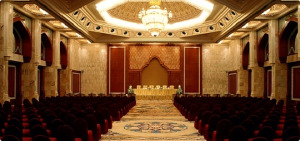
The conflict was solved with Kuwait playing a mediating role. As a result, the Emir of Qatar, Sheikh Tamim Bin Hamad Al-Thani, was forced to take a conciliatory stance, saying that the summit in Doha would be a “signal for new relations”. One of the results was the accession of Qatar, along with the rest of the Gulf States, to supporting Egyptian President A.F. Al-Sisi and the course he has taken. Whether Qatar truly intends to follow its stated obligations, time will tell. One indicator could be the level of terrorist activity in Egypt, the main sponsor of which most analysts believe to be Qatar, with good reason.
Another result of the GCC summit was the decision to create a unified police force. According to the Minister of Foreign Affairs of Qatar Khaled bin Mohammed Al-Attiyah, it is planned to assign to it the functions currently overseen by Interpol. Its headquarters may be located in the capital of the United Arab Emirates – Abu Dhabi. The regional police will coordinate law enforcement agencies of Member States of the GCC in the fight against terrorism, drug trafficking, money laundering, and cybercrime.
Meeting participants also discussed the establishment of a joint Navy based in Bahrain. As conceived by the leaders of the GCC, they must present a deterrent to Iran, which has disputes with Qatar over gas fields in the Persian Gulf, and also protect the routes of transportation of hydrocarbons to world markets and offshore platforms. Information in the media about plans to create a joint Navy appeared in October 2014. This is discussed, in particular, by the newspaper “Al-Sharg al-Awsat”.
The specific time of the beginning of the formation of a unified police and Navy was not mentioned by the Gulf states at the summit. As some experts believe, its implementation is being hindered, especially by serious differences between the Member States of the Cooperation Council for the Arab States of the Gulf themselves on the Syrian issue, relations with Iran, the opposition in Libya, and the Palestinian question.
In addition, the integration plans as part of the GCC affect substantial losses from the sale of oil, which yields 90 percent of the Gulf’s government revenues. The Emir of Kuwait Sheikh Sabah Al-Ahmad Al-Sabah warned of this at the summit. The Gulf monarchies were forced to spend heavily on social programs in order to prevent an explosion of popular discontent. If, due to a further reduction in the price of oil, money will be insufficient, then programs for the creation of new power structures are likely to be relegated to the best of better times. To act otherwise would be to act suicidally, without a sense of self-preservation.
Thus, at the next GCC summit no breakthroughs were actually achieved. It proceeded like another routine meeting, on the one hand allowing the forum host, the Emir of Qatar to save face, on the other hand showing the whole world that the Arab monarchies of the Persian Gulf states are united in the face of common threats.
The next GCC summit will be held in Saudi Arabia. Initially, it was reported that the next host would be Oman, but it refused the honour due to disagreement with the ideas on the transformation of the Cooperation Council for the Arab States of the Gulf into a more integrated inter-state union.
The fact that the meeting in Doha was of a more symbolic character is indirectly supported by the composition of its participants. Three of the six members states of the Council were represented by their monarchs – the King of Bahrain, the Emirs of Kuwait and Qatar. From Saudi Arabia came Crown Prince Salman bin Abdulaziz Al Saud, from the UAE Prime Minister and Vice President Mohammed bin Rashid Al-Maktum, from Oman Deputy Prime Minister Fahd bin Mahmoud Al-Said.
Bakhtiar Usmonov, political scientist and PhD in political science, exclusively for the online magazine “New Eastern Outlook”.
